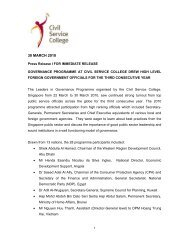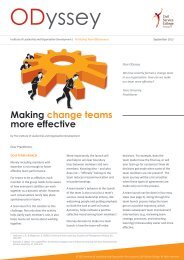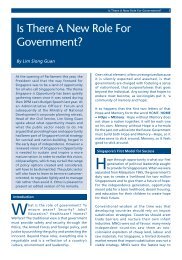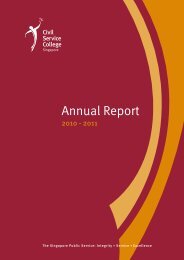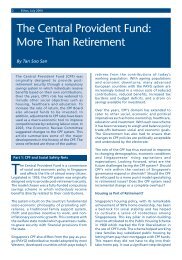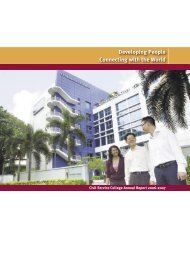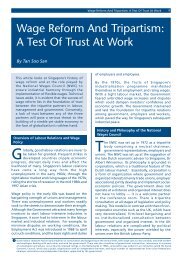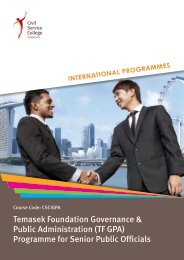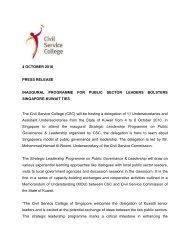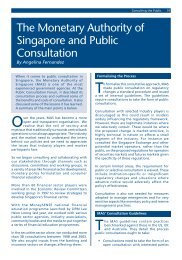The Singapore Public Service and National Development
The Singapore Public Service and National Development
The Singapore Public Service and National Development
Create successful ePaper yourself
Turn your PDF publications into a flip-book with our unique Google optimized e-Paper software.
News Release – “Virtuous Cycles: <strong>The</strong> <strong>Singapore</strong> <strong>Public</strong> <strong>Service</strong> <strong>and</strong> <strong>National</strong> <strong>Development</strong>”<br />
Page-3<br />
better tackle the challenges <strong>and</strong> seize the opportunities in a more complex <strong>and</strong><br />
volatile external environment.”<br />
Although <strong>Singapore</strong> has ongoing programmes to correct strategic, policy-level <strong>and</strong><br />
organisational deficiencies, the book highlights that policy makers have also identified<br />
other important challenges that the <strong>Public</strong> <strong>Service</strong> has been facing in recent years,<br />
among them, employing, training <strong>and</strong> retaining <strong>Public</strong> <strong>Service</strong> leaders <strong>and</strong> officers with<br />
the right skill sets <strong>and</strong> aptitude; engaging <strong>and</strong> catering to the changing needs <strong>and</strong> rising<br />
aspirations of the population; meritocracy <strong>and</strong> income inequality, <strong>and</strong> dealing with<br />
increasingly uncertain, complex <strong>and</strong> cross-cutting policy issues.<br />
<strong>The</strong> success of the <strong>Public</strong> <strong>Service</strong> can be attributed to reforms to capitalise on<br />
institutionalised outcomes such as assigning operational authority to delegated Boards<br />
<strong>and</strong> autonomous agencies, while retaining the power of regulatory oversight <strong>and</strong> policy<br />
direction within central agencies; budgetary reforms to maximise the public sector value<br />
proposition; instilling a culture of ownership, pride <strong>and</strong> continuous improvement in the<br />
<strong>Public</strong> <strong>Service</strong>, through on-going training as well as reform movements such as PS21;<br />
measuring <strong>and</strong> rewarding organisational performance, with incentives <strong>and</strong> awards for<br />
innovative practices; continuous innovation, such as the use of information technology,<br />
to engender greater efficiency, citizen satisfaction, timely information flows <strong>and</strong><br />
transparency <strong>and</strong> a culture of leadership by example, which transmits strong values <strong>and</strong><br />
principles of good governance socially rather than formally throughout the public sector.<br />
Mr. Malhotra concluded,<br />
“As UNDP, we are particularly pleased with this opportunity to examine this<br />
specific inspiring example of development achievement because of the early<br />
significant role played by UNDP <strong>and</strong> other UN agencies in <strong>Singapore</strong>’s history.<br />
As you will learn when you read the book, one of the first acts of the new<br />
government when <strong>Singapore</strong> attained self-rule in 1959 was to request advice<br />
from the United Nations Exp<strong>and</strong>ed Programme of Technical Assistance (UN-<br />
EPTA), which would later become UNDP, to develop a blueprint for an<br />
industrialization programme for <strong>Singapore</strong>. Dr Albert Winsemius, a Dutch<br />
economist, led the first UN assessment mission to <strong>Singapore</strong> in 1960 which<br />
presented a ten-year development plan to transform <strong>Singapore</strong> into a centre of<br />
manufacturing <strong>and</strong> industrialization to the government, most of which was<br />
implemented with considerable success.<br />
In the following decades, UNDP together with other UN agencies such as the<br />
FAO, ILO, ITU, UNESCO, UNIDO, UNCTAD, WHO as well as the World Bank,<br />
would provide technical expertise in areas ranging from urban planning,<br />
agriculture <strong>and</strong> fisheries, manufacturing, transportation <strong>and</strong> communication, to<br />
education, health <strong>and</strong> government reform. This was indeed a good example of<br />
effective development cooperation, which should st<strong>and</strong> as an example to the<br />
international development community.”<br />
* * *



